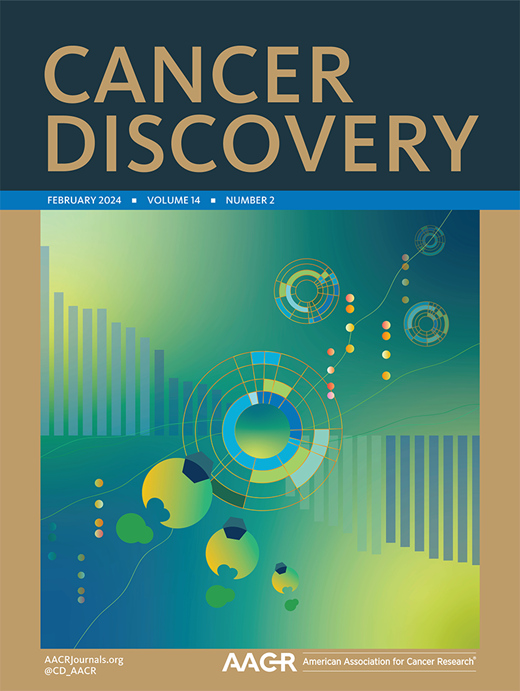同种肿瘤模型的时序基因组分析揭示了黑色素瘤免疫逃避的关键调控因子
IF 29.7
1区 医学
Q1 ONCOLOGY
引用次数: 0
摘要
肿瘤内异质性(ITH)低与患者存活率和免疫疗法反应的增加相关。然而,即使是高度同质性肿瘤也具有不同程度的侵袭性,而影响侵袭性的免疫学因素仍未得到充分研究。在这里,我们分析了低 ITH 小鼠肿瘤的免疫逃逸机制。我们利用免疫分型和单细胞 RNA 测序技术,比较了体内移植、基因相似的排斥性单细胞克隆与非排斥性单细胞克隆的时间生长情况。与排异克隆相比,未排异克隆表现出肿瘤相关巨噬细胞(TAMs)的高浸润性、较低的T细胞浸润性和较高的T细胞耗竭性。通过对排斥相关基因表达程序进行比较分析,并结合体内CRISPR基因敲除筛选候选调控因子,发现Mif(巨噬细胞迁移抑制因子)是导致免疫排斥的主要因素。Mif基因敲除后,肿瘤变小,TAM浸润减少。这些结果在黑色素瘤患者数据中得到了验证。总之,我们的同种肿瘤系统可以发现调节生长变异的因素,并确定 Mif 对侵袭性黑色素瘤至关重要。本文章由计算机程序翻译,如有差异,请以英文原文为准。
Temporal genomic analysis of homogeneous tumor models reveals key regulators of immune evasion in melanoma
Low intra-tumor heterogeneity (ITH) correlates with increased patient survival and immunotherapy response. However, even highly homogeneous tumors are variably aggressive, and the immunological factors impacting aggressiveness remain understudied. Here, we analyzed the mechanisms underlying immune escape in murine tumors with low ITH. We used immunophenotyping and single-cell RNA sequencing to compare the temporal growth of in-vivo transplanted, genetically similar rejected vs. non-rejected single-cell clones. Non-rejected clones showed high infiltration of tumor-associated macrophages (TAMs), lower T-cell infiltration, and increased T-cell exhaustion compared to rejected clones. Comparative analysis of rejection-associated gene expression programs, combined with in-vivo CRISPR knockout screens of candidate regulators, identified Mif (macrophage migration inhibitory factor) as a major contributor to immune rejection. Mif knockout resulted in smaller tumors and reduced TAM infiltration. These results were validated in melanoma patient data. Overall, our homogeneous tumor system can uncover factors regulating growth variability and identifies Mif as critical in aggressive melanoma.
求助全文
通过发布文献求助,成功后即可免费获取论文全文。
去求助
来源期刊

Cancer discovery
ONCOLOGY-
CiteScore
22.90
自引率
1.40%
发文量
838
审稿时长
6-12 weeks
期刊介绍:
Cancer Discovery publishes high-impact, peer-reviewed articles detailing significant advances in both research and clinical trials. Serving as a premier cancer information resource, the journal also features Review Articles, Perspectives, Commentaries, News stories, and Research Watch summaries to keep readers abreast of the latest findings in the field. Covering a wide range of topics, from laboratory research to clinical trials and epidemiologic studies, Cancer Discovery spans the entire spectrum of cancer research and medicine.
 求助内容:
求助内容: 应助结果提醒方式:
应助结果提醒方式:


